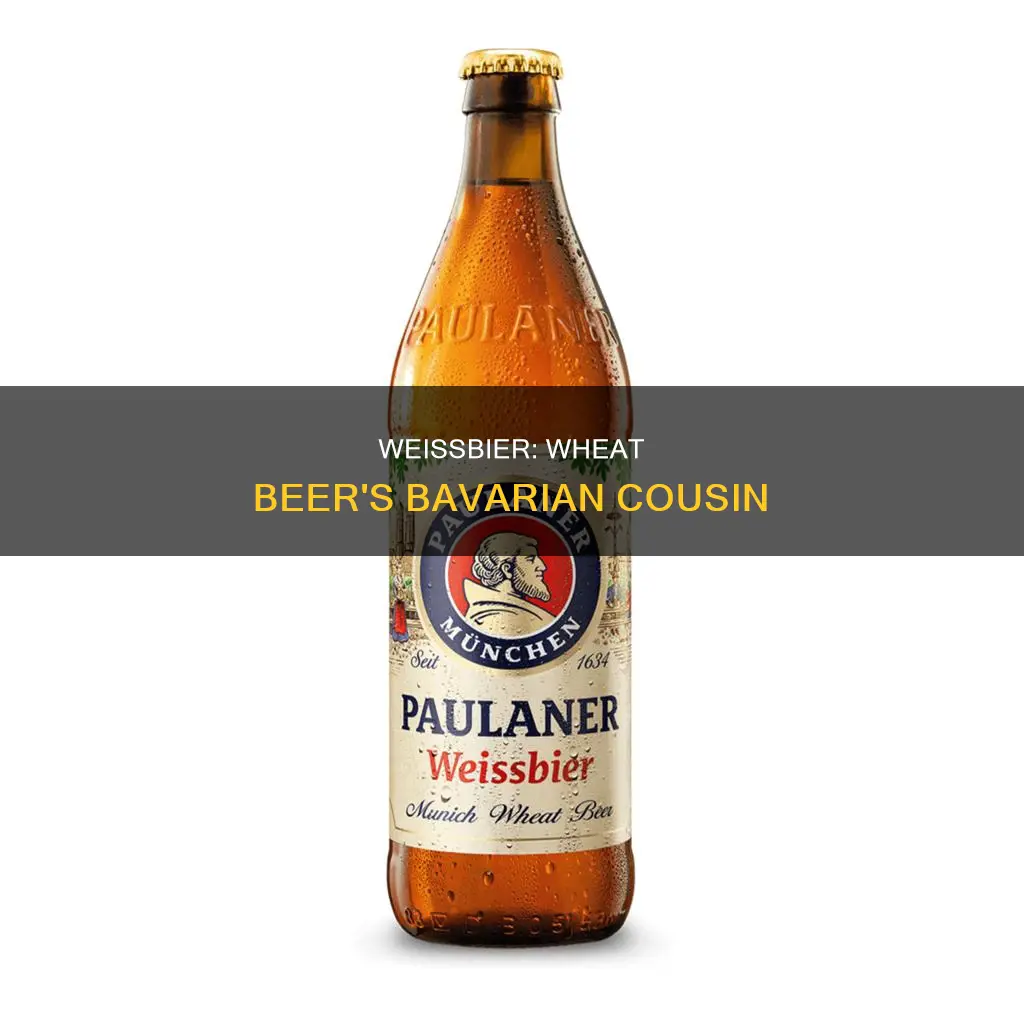
Weissbier, also known as Weizenbier or Weißbier, is a type of German wheat beer. It is top-fermented and brewed with a large proportion of wheat relative to the amount of malted barley. Weissbier is characterised by its cloudy appearance and distinctive taste, which is often likened to cloves, nutmeg, vanilla, banana, and bubblegum. The amount of wheat used in the grist mix can range from 40% to as much as 60%, with Bavarian yeast strains used to ferment the beer. Weissbier is typically served in a large, curvaceous glass known as a weizen vase, which showcases the beer's beautiful glow and foam cap.
| Characteristics | Values |
|---|---|
| Type of Beer | Wheat Beer |
| Other Names | Weizenbier, Weißbier |
| Origin | Germany |
| Main Varieties | German Weizenbier, Belgian Witbier |
| Wheat Content | At least 50% |
| Colour | Pale Golden to Gold, Clear to Dark Gold, Copper to Rich Brown, Dark Amber to Dark Brown |
| Flavour | Banana, Clove, Bubblegum, Bready, Malty, Caramel, Chocolaty, Fruity, Spicy |
| Alcohol Content | Low to Moderate |
| Carbonation | High |
| Bitterness | Low |
| Malt Sweetness | Very Low to Medium-Low |
| Yeast | Top-Fermenting, Torulaspora delbrueckii |
| Serving Temperature | Best Served Freshly Poured |
| Glassware | Weizen Vase |
What You'll Learn
- German Weizenbier and Belgian Witbier are the two main varieties of wheat beer
- Weizenbier is German for wheat and is also known as Weissbier
- Hefeweizen is a type of Weizenbier, with a strong presence of banana and clove
- Kristallweizen is a Hefeweizen with the yeast filtered out, resulting in a cleaner, crisper mouthfeel
- Dunkelweizen is a darker Hefeweizen with roots in Bavarian dark wheat beer culture

German Weizenbier and Belgian Witbier are the two main varieties of wheat beer
Wheat beer is a top-fermented beer brewed with a large proportion of wheat relative to the amount of malted barley. The two main varieties of wheat beer are German Weizenbier (or Weissbier) and Belgian Witbier.
German Weizenbier
Weizenbier, or Weissbier, is a larger category of German wheat beers. All Weizenbiers are top-fermented (ale style) and brewed with a special strain of yeast that lends unique flavours to the finished beer. This yeast is what gives Weizenbier its characteristic clove and banana flavours. By law, Weizenbiers brewed in Germany must use a "top-fermenting" yeast. The Hefeweizen style is particularly noted for its low hop bitterness and relatively high carbonation. Weizenbiers can be clear, like a Kristallweizen, hazy, like a Hefeweizen, or even amber to mahogany in colour, like a Dunkelweizen.
Belgian Witbier
Witbier, or "white beer", is a barley/wheat, top-fermented beer brewed mainly in Belgium and the Netherlands. It gets its name from the suspended yeast and wheat proteins, which cause the beer to look hazy or white when cold. Witbiers are typically brewed with coriander, citrus, and other spices, which complement the bready, bright wheat notes. Belgian Witbiers often include spices like coriander and orange peel, resulting in a refreshing and slightly spicy flavour profile. Witbiers are always cloudy.
Lagers and Wheat Beers: What's the Difference?
You may want to see also

Weizenbier is German for wheat and is also known as Weissbier
Wheat beer is a top-fermented beer brewed with a large proportion of wheat relative to the amount of malted barley. The two main varieties are German Weizenbier and Belgian witbier.
Weissbier is a larger category of German wheat beers, related to American Wheat Ales and Belgian Witbier. It is traditionally from Bavaria and was introduced there in the 15th century. By law, Weissbiers brewed in Germany must use a "top-fermenting" yeast. Specialized yeast strains are used, which produce overtones of banana and clove as by-products of fermentation.
The Hefeweizen style of Weizenbier is particularly noted for its low hop bitterness and relatively high carbonation. It gets its name from the German "hefe", meaning yeast, and "weizen", meaning wheat. It is characterized by a strong presence of banana and clove, and even vanilla or bubblegum in its aroma and flavor.
The Kristallweizen style of Weizenbier is what you get when you filter the yeast out of a Hefeweizen. This results in a cleaner, crisper mouthfeel with slightly less banana, clove, and bubblegum flavors.
The Dunkelweizen style of Weizenbier is a darker Hefeweizen with roots in the dark wheat beer culture of Bavaria. It still uses the same special yeast strain as Hefeweizen, so notes of banana and clove will still be present, rounded out with the bready, malty character of the beer and possible hints of caramel.
The Weizenbock style of Weizenbier is basically a Dunkelweizen done Bock style, which means it is stronger in alcohol and body. It is brewed with the same special Weissbier yeast, so some of the banana and clove characteristics will show up in the bigger, maltier flavor profile.
Wheat in Sapporo Beer: What You Need to Know
You may want to see also

Hefeweizen is a type of Weizenbier, with a strong presence of banana and clove
Wheat beer is a top-fermented beer brewed with a large proportion of wheat relative to the amount of malted barley. The two main varieties are German Weizenbier and Belgian witbier. Weizenbier, or Weißbier, is German for "white beer", referring to the pale malt used, as opposed to "brown beer" made from dark malt.
Hefeweizen is made up of over 50% wheat, and the wheat gives the beer a silky, creamy texture and a big, beautiful long-lasting head. The beer is characterised by fruity notes, with banana and clove being the most prominent, but vanilla and bubblegum flavours are also present in the aroma and flavour. The beer is also notable for its low hop bitterness and relatively high carbonation.
Hefeweizen is a classic German wheat ale, made with a high ratio of wheat in the grain bill. The beers are cloudy and delicious, with a malty and bready flavour, and lively bubbles to lift up the flavour. The beers are also noted for their lack of bitterness and few noticeable hop characteristics.
Wheat Allergy and Beer: Is It Safe to Drink?
You may want to see also

Kristallweizen is a Hefeweizen with the yeast filtered out, resulting in a cleaner, crisper mouthfeel
Kristallweizen, or Kristallweissbier, is a filtered version of Hefeweizen, a traditional Bavarian wheat beer. The process of filtering removes the yeast and wheat haze, resulting in a clear, crisp, and clean-tasting beer.
Hefeweizen is characterised by its cloudy appearance, due to the presence of yeast and wheat proteins. The yeast used in Hefeweizen is typically a top-fermenting ale yeast, which lends the beer its signature banana and clove notes. The wheat used in the brewing process gives the beer its creamy texture.
By filtering out the yeast and wheat haze, Kristallweizen achieves a crystal-clear appearance. This filtration process results in a cleaner, crisper mouthfeel compared to its unfiltered counterpart. While the banana and clove flavours remain, they are more subdued. The beer takes on a lighter, more delicate quality, making it a refreshing choice for a hot day.
The colour of Kristallweizen can range from pale straw to gold, and it has a low ABV of around 4.3% to 5.6%. This style of beer is less common in America, with most Kristalls being German. Kristallweizen is perfect for brunch and pairs well with salads, roast pork, lighter sausages, and seafood.
Overall, Kristallweizen is a refreshing and delicate beer, offering a unique twist on the classic German Hefeweizen.
Wheat Beer Expiry: How Long Does It Last?
You may want to see also

Dunkelweizen is a darker Hefeweizen with roots in Bavarian dark wheat beer culture
Dunkelweizen is a darker version of Hefeweizen, a type of German wheat beer. The name, which comes from the German words for "dark" (dunkel) and "wheat" (weizen), hints at its nature as a dark wheat beer.
Dunkelweizen is an unfiltered ale, with its roots firmly in the dark wheat beer culture of Bavaria, Germany. It is brewed with a high percentage of wheat, typically at least 50% of the malted cereal bill, which is then roasted and caramelised, giving the beer its unique flavour and dark colour. The special strain of yeast, Torulaspora delbrueckii, used in the fermentation process imparts classic Hefeweizen flavours of banana and clove, and even bubblegum. The same yeast is used in the production of both Hefeweizen and Dunkelweizen, so the two beers share some flavour characteristics.
However, Dunkelweizen differs from its lighter cousin in the use of darker malts, usually Munich or Vienna malts, which lend a rich, malty character to the beer, with possible hints of caramel, toffee, vanilla, or nuttiness. Some versions may even have chocolate and roasted flavours, similar to a Dunkel lager. The appearance of Dunkelweizen can range from dark golden to dark brown, and it is often cloudy.
Dunkelweizen is considered a very accessible and easy-drinking beer, with a soft mouthfeel and high carbonation. It is surprisingly refreshing during the summer months and pairs well with traditional German dishes, especially pork sausages and salty roasted pork, which complement the sweet malt flavour of the beer.
Hefeweizen: Wheat Beer, But Different
You may want to see also
Frequently asked questions
Weissbier, also known as Weizenbier or Weißbier, is a type of German wheat beer. It is top-fermented and brewed with a minimum of 52% wheat to barley malt.
Weissbier is known for its distinctive taste, which is often likened to cloves, nutmeg, and vanilla. It is also described as fruity, with banana being a common flavour note.
There are several varieties of Weissbier, including:
- Hefeweizen (cloudy appearance)
- Kristallweizen (clear appearance)
- Dunkelweizen (dark wheat)
- Weizenbock (strong wheat beer)







